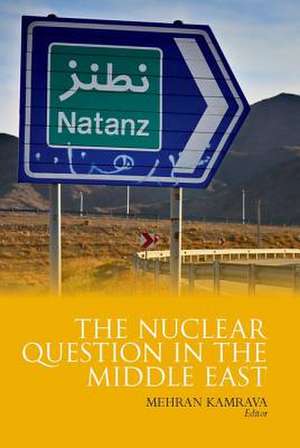Nuclear Question in the Middle East
Editat de Mehran Kamravaen Limba Engleză Hardback – 29 feb 2012
What are the key domestic drivers of nuclear behaviour and decision-making in the Middle East? How are the states of the Gulf Cooperation Council seeking to employ nuclear energy to further guarantee and expedite their hyper-growth of recent decades? Are there ideal models emerging in this regard that others might emulate in the foreseeable future, and, if so, what consequences is this development likely to have for other civilian nuclear aspirants? These region-wide themes form the backdrop against which specific case studies are examined.
| Toate formatele și edițiile | Preț | Express |
|---|---|---|
| Paperback (1) | 171.71 lei 22-36 zile | |
| HURST C & CO PUBLISHERS LTD – 30 apr 2012 | 171.71 lei 22-36 zile | |
| Hardback (1) | 329.40 lei 22-36 zile | |
| Oxford University Press – 29 feb 2012 | 329.40 lei 22-36 zile |
Preț: 329.40 lei
Nou
Puncte Express: 494
Preț estimativ în valută:
63.03€ • 65.99$ • 52.15£
63.03€ • 65.99$ • 52.15£
Carte disponibilă
Livrare economică 17-31 martie
Preluare comenzi: 021 569.72.76
Specificații
ISBN-13: 9780199327805
ISBN-10: 0199327807
Pagini: 276
Dimensiuni: 145 x 218 x 30 mm
Greutate: 0.54 kg
Editura: Oxford University Press
ISBN-10: 0199327807
Pagini: 276
Dimensiuni: 145 x 218 x 30 mm
Greutate: 0.54 kg
Editura: Oxford University Press
Notă biografică
Recenzii
'A top flight collection of essays on one of the most controversial and sensitive topics in both Middle East politics and studies of nuclear proliferation in general. - provides a great overview of how the current situation has come about, and how regional actors are likely to press ahead in the medium and longterm future. A solid multidisciplinary investigation into a key global issue.' - Christopher Davidson, Reader in Middle East Politics at Durham University 'Combining theoretical perspectives with rich empirical insights, this superb volume offers a comprehensive exploration of nuclear dynamics in a rapidly changing Middle East. The research is well-organized, well-written and highly nuanced - an elusive combination. The authors are informed by a deep historical sensibility, yet are also forward looking in their analyses. In particular, the chapters on the domestic sources of nuclear decision-making will be of immense value to specialists and policymakers grappling with the still-unfolding implications of the Arab revolts and Iran's nuclear ambitions.' - Frederic Wehrey, Senior Policy Analyst, RAND Corporation and author of Coping with a Nuclearizing Iran (RAND, 2011). 'While the world watches Iran, and tries to guess how many nuclear weapons Israel has, nuclear programs are being developed across the Middle East. The timely message in this valuable study of the current situation is that the Middle East is going nuclear whether the world likes it or not.' - Jeremy Salt, Department of Political Science at Bilkent University (Ankara), and author of The Unmaking of the Middle East. A History of Western Disorder in Arab Lands
